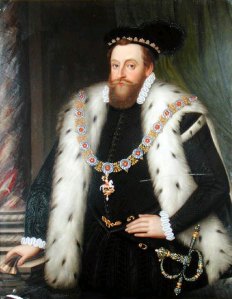I wasn’t going to stay on the subject of the accuracy and objectivity (or not) of reported news, but sometimes you have to go where the story is, and in both recent media and recent reading I’ve been coming across the unashamed inventing of facts. Incidentally, I don’t intend to have all my posts relate old and new (a format done so much better by Lisa Jardine in her radio 4 Point of View pieces), but bear with me.
The excellent article by Charlie Brooker on the coverage of the Norway massacre was Brooker at his best, and articulates much better than I could how shocking, distasteful and racist the reportage was immediately following the event, where somehow, without any evidence whatsoever, the actions of a white, blond Islamaphobe were assumed to be that of an anti-western al-Qaida cell.

English control of Irish lands in 1494, and under Elizabeth I and James I
At the moment, I’m trying to improve my knowledge of 16th century Ireland, and since I don’t have a lot of time for this I’m having to rely on just a few pieces of mainly secondary criticism. What I’m digesting is a particular historical narrative: ‘History’ is a story, it’s a version of events not the events themselves. This is old hat, but easily forgotten, especially when you’re searching for a quick low-down on a subject. Anglo-Irish history is one of those areas that one has to tread even more carefully around, where early and not-so-early sources can contain real bias, and I’m very conscious of getting it ‘right’.
A writer cannot help but approach a subject with a degree of bias; this is the result of being just one individual in a greyscale world of billions. Sometimes, subconsciously you bring your own interests to an interpretation; sometimes, this bias is 100% intentional. Take for example the bill of attainder, or piece of legislation declaring guilt without trial, prepared by the Irish council on the Irish rebel/magnate/king (depending on who you ask) Shane O’Neill after his assassination.
Sir Henry Sidney was Elizabeth I’s chief governor in Ireland from 1566-71 and 1575-78, and began a campaign against O’Neill in 1566; a priority on which the success of Sidney’s deputyship would rest.[1] Despite Sidney’s earlier campaigns going badly, and the actual death of O’Neill being by the hands of his long-term enemies the MacDonnells, the bill of attainder creates a very different impression.
The attainder works to concrete not just an English version of events but one that specifically favours Sidney. The role of Lord Deputy was famously risky in terms of reputation and political standing; at the time of Sidney’s posting, the personalised nature of governance there meant that responsibility for gains and losses fell to this single figurehead. A crown representative abroad, whether Lord Deputy or ambassador, was inherently vulnerable to political attack from his enemies at home, by virtue of his geographical estrangement from the court.
Sidney, for example, had to battle against the negativity and ‘slander’ of his predecessor the earl of Sussex, an enemy of Sidney’s patron the earl of Leicester.[2] Rather than defending themselves by making their presence felt at court, by vocally representing their cause in person, estranged subjects were often forced to defend themselves by pen and ink; inscribing the facts to their own benefit in letters and discourses, trying to literally ‘set’ the record, straight or otherwise.

Sir Henry Sidney (1529–1586), attrib. Arnold Bronckorst, 1573
Something like this is happening in the O’Neill attainder, where Sidney’s failed military campaigns are not mentioned and his predecessor Sussex is excised entirely; it is written instead that the ‘arrogant, undutifull and trayterous’ O’Neill ran amok ‘untill the arrival of Sir Henry Sidney’ – cue Sidney striding onto the narrative stage like some caped crusader.
Sidney is granted agency as the one who ‘did pronounce him a rebell’, and, side-stepping any possible political machinations behind the murder and the lack of personal military success for Sidney, the actual activity of the assassination becomes the climax of an extended tale of ‘quaffing and drinking of wine’, complete with sexual insult and gruesome detail.[3] Sidney glows as ‘prudent, and well disposed…most fit…truly beloved’ and O’Neill meets a fittingly barbarous end: for a piece of legislation the attainder is at times a dramatic read, obscuring less desirable aspects in the sound of its own trumpeting praise.[4]
So, in the absence of facts or where facts are undesirable, the unfettered writer can adhere to the popular narrative and bang their drum, using the trigger event to compose the story they wanted to publicize. The problem is, write something down and it takes on something of fact, even if later disproved; the ire and fear conjured by asserting the Islamic terrorist connection outlasted the claims of al-Qaida responsibility, even leaving aside the bizarre second-wave of fear that blamed Muslims for being a provocation to the mass murderer’s actions. It adds to a wider narrative.
When you approach an unfamiliar subject, you can try to read several accounts, and of course do so critically, but at the end of the day you put trust in what you read; it’s up to the reader to select reliable sources of authority, use critical reading to judge them as such, and the apparent authorities to deserve positive judgment. We can do better.
[1] Ciaran Brady, The chief governors : the rise and fall of reform government in Tudor Ireland, 1536-1588, (New York : Cambridge University Press, 1994) p125
[4] James Butler (ed.), The Statutes at large, passed in the Parliaments held in Ireland (Dublin: George Grierson, 1786-1801), vol.1, p326



